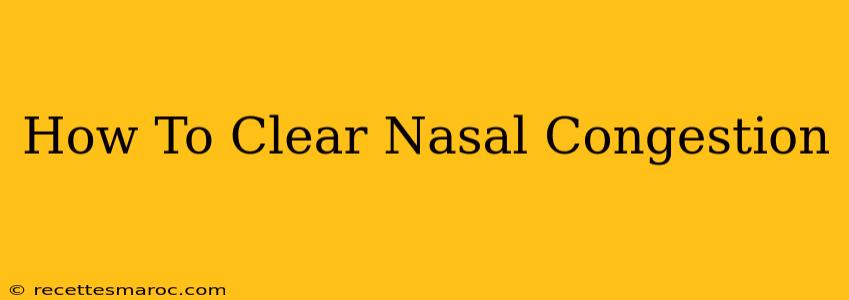Nasal congestion, that frustrating blockage in your nose, can make breathing, sleeping, and even enjoying your favorite foods difficult. It's a common symptom of various illnesses, allergies, and environmental factors. Fortunately, there are several ways to clear nasal congestion, ranging from simple home remedies to medical interventions. This guide will walk you through effective methods and when you should seek professional help.
Understanding Nasal Congestion
Before diving into solutions, it's helpful to understand what causes nasal congestion. The lining of your nasal passages becomes inflamed, swelling and narrowing the air passages. This inflammation is triggered by various factors, including:
- Viral infections (like the common cold): This is a primary cause, leading to mucus production and inflammation.
- Allergies (hay fever, pet dander, etc.): Allergens trigger an immune response, resulting in inflammation and congestion.
- Bacterial infections (sinusitis): A bacterial infection in the sinuses can cause significant nasal congestion and other symptoms.
- Environmental irritants: Dust, smoke, and other pollutants can irritate the nasal passages.
- Dry air: Low humidity can dry out the nasal passages, leading to congestion.
- Nasal polyps: These noncancerous growths can obstruct airflow.
- Deviated septum: A crooked nasal septum can partially block one nasal passage.
Home Remedies for Nasal Congestion Relief
Many effective remedies can alleviate nasal congestion without medication. These are best used for mild to moderate congestion:
Hydration:
- Drink plenty of fluids: Water, herbal tea, and clear broths help thin mucus, making it easier to drain. Staying hydrated is crucial for overall health and congestion relief.
Saline Nasal Rinse (Neti Pot):
- Irrigate your nasal passages: A saline rinse can wash away irritants, allergens, and mucus. Use distilled or sterile water to prepare the solution. Proper technique is essential to avoid complications.
Steam Inhalation:
- Inhale steam: The warm, moist air can help loosen mucus. Add a few drops of essential oils like eucalyptus or peppermint for added relief. Be cautious to avoid burns.
Elevating Your Head:
- Sleep with your head elevated: Using extra pillows can help drain mucus and improve breathing while sleeping.
Humidifier:
- Use a humidifier: Adding moisture to the air can help prevent nasal dryness and congestion.
Over-the-Counter (OTC) Medications
If home remedies aren't enough, several OTC medications can provide relief:
- Decongestants: These medications, available as nasal sprays or oral tablets, constrict blood vessels in the nasal passages, reducing swelling. Avoid prolonged use of nasal spray decongestants, as they can cause rebound congestion.
- Saline nasal sprays: These are a gentler alternative to decongestant sprays.
- Pain relievers: Over-the-counter pain relievers like acetaminophen or ibuprofen can help reduce pain and fever associated with congestion.
When to See a Doctor
While many cases of nasal congestion resolve on their own, it's important to seek medical attention if:
- Congestion lasts longer than 10 days.
- You experience severe pain or pressure in your sinuses.
- You have a high fever (over 101°F).
- You have green or yellow mucus (potentially indicating a bacterial infection).
- You have difficulty breathing.
- You experience facial swelling.
A doctor can diagnose the underlying cause of your congestion and recommend appropriate treatment, which may include antibiotics for bacterial infections or other medical interventions.
Preventing Nasal Congestion
While you can't always prevent congestion, you can take steps to reduce your risk:
- Avoid allergens: Identify and minimize exposure to known allergens.
- Wash your hands frequently: This helps prevent viral infections.
- Avoid smoking and secondhand smoke.
- Maintain a healthy lifestyle: Adequate sleep, proper nutrition, and regular exercise support your immune system.
Remember, this information is for general knowledge and doesn't replace professional medical advice. Always consult a doctor or other qualified healthcare professional for diagnosis and treatment of nasal congestion or any other health concern.

